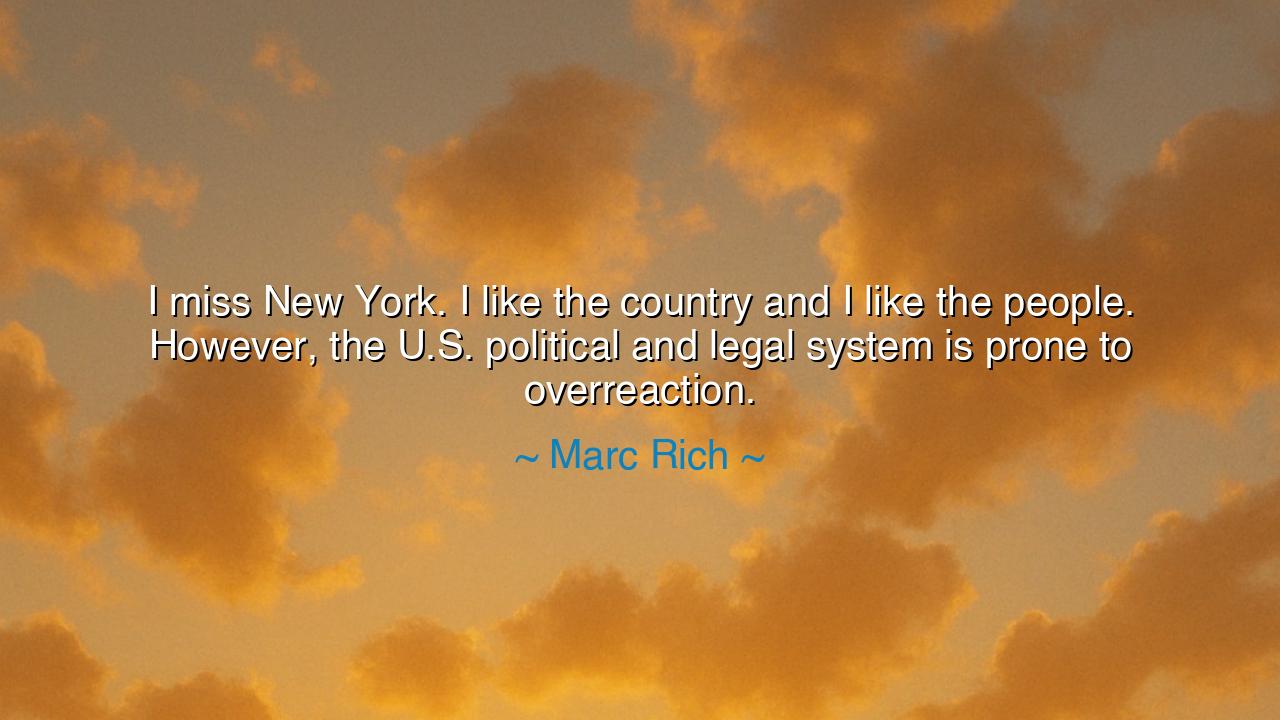
I miss New York. I like the country and I like the people.
I miss New York. I like the country and I like the people. However, the U.S. political and legal system is prone to overreaction.






There are words that emerge not from comfort, but from exile — and in them, we hear the ache of both love and disillusionment. Marc Rich, the controversial financier and fugitive, once said: “I miss New York. I like the country and I like the people. However, the U.S. political and legal system is prone to overreaction.” His voice, though burdened by scandal, carries a tone both nostalgic and critical — the voice of a man who loved a nation’s vitality, yet distrusted its justice. In his lament lies a timeless warning: that even great nations, when gripped by anger and moral panic, may lose their balance between righteousness and reason.
The origin of this quote reaches into the turbulent life of Marc Rich — a man once hailed as a genius of global trade, and later condemned as one of America’s most notorious fugitives. Born in Belgium and raised in the United States, he rose to power in the world of commodities, building an empire that spanned continents. Yet when charged with tax evasion and illegal trading with Iran, he fled the country rather than face trial. From his exile in Switzerland, Rich looked back at the land that had once given him opportunity — and spoke these words. His statement, though colored by personal grievance, reflects a larger truth about the fickleness of justice in times of outrage.
When Rich says that the U.S. political and legal system is prone to overreaction, he speaks of the way public fury can transform law from a tool of fairness into a weapon of vengeance. In every age, societies have struggled with this peril. The Greeks knew it in the tale of Orestes, who avenged his father’s murder and was pursued by the Furies — divine embodiments of retribution without mercy. Only when Athena intervened, founding the first court of law, was the cycle of vengeance broken. Yet even she warned that the spirit of rage could return whenever men sought punishment not for justice’s sake, but for power or pride. Rich’s words echo that ancient warning: that a society ruled by overreaction forgets the balance that sustains its freedom.
Indeed, history abounds with examples of justice turned into spectacle. In the days of the Salem witch trials, fear became law; accusation became guilt. In the Red Scare of the twentieth century, suspicion was enough to ruin lives. These moments, though distant, are not relics — they are mirrors. The same impulse to overreact still dwells in every human heart: the desire to destroy what offends us, rather than understand it. Rich, though far from innocent, recognized that when law begins to serve emotion rather than principle, the nation’s soul grows restless, and fairness gives way to fury.
Yet his words are not entirely bitter. “I miss New York,” he said — a confession of longing that softens the edge of his criticism. For despite his exile, he did not renounce his homeland; he mourned it. He admired its people, its energy, its ambition. In that love, we glimpse the eternal tension between the individual and the state — the citizen who builds within a system, and the system that can swiftly turn upon its builder. Rich’s statement is not only about America; it is about all human societies, which must constantly choose between compassion and condemnation, between the steady hand of justice and the clenched fist of wrath.
In his exile, Marc Rich lived with wealth but without belonging — a reminder that no fortune can replace the freedom of reconciliation. His life, like that of so many who fall from power, teaches that law must be tempered by wisdom, and that mercy must walk beside judgment. The state that punishes without reflection becomes a mirror of the very lawlessness it seeks to contain. Rich’s words call us to remember that justice is not about the swiftness of response, but the depth of understanding — that the strength of a nation lies not in its capacity to condemn, but in its capacity to discern.
Let this lesson, then, pass to the generations that follow: do not let outrage become your compass. A people who act only in reaction lose sight of truth. When anger governs judgment, even the just may fall into error. The wise must learn to pause — to weigh, to reflect, to see the human heart beneath the headline. As Marc Rich discovered, the systems we create reflect our own tempers. If we demand only vengeance, we will build laws that destroy; if we demand understanding, we will build laws that endure. So may we learn to hold justice not in the clenched fist of wrath, but in the open hand of wisdom — firm, fair, and guided always by the light of reason.






AAdministratorAdministrator
Welcome, honored guests. Please leave a comment, we will respond soon